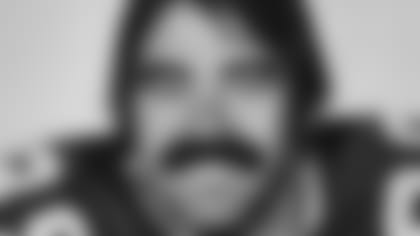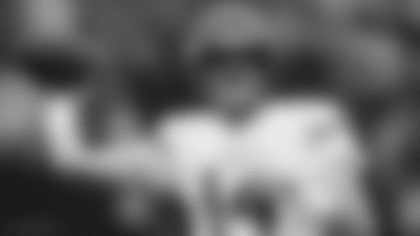University of Oklahoma Head Coach Chuck Fairbanks may have been on to something when he sensed that his junior tight end Steve Zabel should be the one doing the tackling instead of being tackled.
"After the first four games, we were 1-3," Zabel says. "Chuck Fairbanks called me in his office and said, 'Steve, we've proven we can't outscore people. We want you to play defensive end as well as tight end and see if we can't win some games.' For me, it was a great transition. I played both ways and punted, and we won our last six games in a row and won the Big Eight Championship."
Playing only tight end during his senior season, Zabel still made a bone-jarring-like hit with the Eagles, who chose him in the first round, No. 6 overall, of the 1970 NFL Draft.
Making eight starts at tight end during his first season in Philadelphia, the following year was a flashback to Zabel's college days when he was moved to defense.
"As a rookie tight end, I'd gotten kicked out of three games for fighting. And at the end of the year, they told me they didn't think I had the proper temperament to be successful on offense and wanted to move me to outside linebacker," Zabel says. "I jumped at the opportunity. My rookie year, I came into camp weighing almost 270 pounds. They told me they wanted me to get big to be a blocking tight end, and it really hampered my speed and agility.
"My second year, I came to Training Camp as an outside linebacker weighing 230 pounds. I gained all my quickness and speed back. It was a wonderful thing. I was all for playing linebacker, believe me."
Zabel proved to be a solid outside linebacker, but gamedays for him and the Eagles were generally less than enjoyable. They won three games in 1970, six the following season, and only two in 1972. Posting an 11-31 record over those three seasons, how'd he keep his confidence?
"Each one of us as players, in order to feel right about yourself, you have to give it 100 percent. The adage in football is, 'The eye in the sky does not lie.' If you played bad in a game, it would show up on the film. And if you played enough bad games, they would get rid of you. I didn't want that to happen, so I always played as well as I could," Zabel says.
"Our team record hadn't ever been great, and people wanted to know why. Did we have lousy players? No, we had a lousy owner that fired our coach every two years. (In 1971) Leonard Tose fired Jerry Williams and we had a new coach, Eddie Khayat. Eddie took over and we were 6-3-1 our last 10 games. And something happened between Eddie Khayat's inaugural season as the head coach and his second season because he started being ridiculously tough. We spent nine weeks in Training Camp in 1972, and we went two-a-day practices for nine solid weeks.
"And then they traded (Tim) Rossovich away and moved me into middle linebacker. And I can tell you, middle linebacker in pro football is not the place to learn. I hurt my right knee and then I hurt my left knee and I ended up missing half the games. At the end of that year, they fired Eddie Khayat and Mike McCormack was hired. So going into my fourth year, I was starting on my third head coach."
McCormack would be Zabel's third and final head coach as an Eagle. Following the 1974 season, contract negotiations proved to be, if nothing else, eye-opening.
"I tried to negotiate in January, February, March, April, May, and got into June and finally said, 'I'd like to have a meeting with (General Manager) Jimmy Murray and Mike McCormack and kind of get the lowdown on why you do not want to give me a raise,'" Zabel says. "After going through the films and figuring out how I did, every game I thought I played bad in, they said I played good. And every game I thought I played good in, they thought I played bad.
"And then McCormack said to me, 'By the way, do you know that you broke Cover 2 52 times this last year?' And I said, 'Excuse me? It would seem to me that if I was the coach, I would have told me that I was doing it wrong rather than wait until the end of the year.' I was asking for a contract for $75,000, and I got up and said, 'You know what, Coach? I wouldn't play for you for $100,000.' I walked out the door and stuck my head back in and said, 'Well, maybe for $100,000, I would.' And I got traded two hours later to the New England Patriots."
After five seasons with the Eagles and four with the Patriots, Zabel wrapped up his 10-year NFL career with the then-Baltimore Colts in 1979 before making his home back in Oklahoma.
"When I got out of football, I got into real estate development and the oil and gas business," Zabel says. "And then the economy in Oklahoma back in '84, '85 went to heck in a handbasket. So, I kind of had to start over and I got into telecommunications, and I did that for 20 years."
In the early 1990s, Zabel and a college teammate, Larry Bross, founded a nonprofit organization in Oklahoma City called City Care.
"We originally started out by feeding the homeless Monday through Friday mornings," Zabel says. "We got to the kitchen at 5 AM five days a week. As a matter of fact, the first day I showed up, I cooked 72 dozen eggs. We had about 350 people that we served."
That was just the beginning. In 1995, Zabel and Bross started a tutor/mentor program called Whiz Kids. It works one-on-one with approximately 1,000 students during the school year throughout Oklahoma City.
"And then the third element of what we did was when the Murrah Building blast in Oklahoma City happened in 1995," Zabel says. "It destroyed virtually all of the transitional housing rooms in Oklahoma City, and so our organization, City Care, volunteered to build back those rooms that we lost. And we built a transitional housing development called the Pershing Center that houses up to 60 clients. We provided them room and board and counseling services to bring them back to society. And along the way, we built another 100 rooms for affordable housing in downtown Oklahoma City.
"We met people where they live and where it's needed, and it's been a rewarding situation. I retired when I was 66 from doing that, and it's still going strong seven years later. So that's good."
Enjoying his retirement, Zabel makes his home in Edmond, Oklahoma. He has a daughter, Jessica; two sons, Matt and Mason; and nine grandchildren.






















